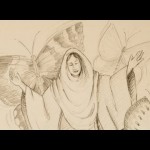 This summer, I’ll be sharing a series of short personal stories from the Our Voices, Our Stories booklet published by the Evangelical Lutheran Church in America’s Justice for Women program. It is available in full on the program’s website, and is described thus:
This summer, I’ll be sharing a series of short personal stories from the Our Voices, Our Stories booklet published by the Evangelical Lutheran Church in America’s Justice for Women program. It is available in full on the program’s website, and is described thus:
“Rooted in the gospel, truth-telling is a part of all social change, no less so when confronting patriarchy and sexism. This booklet of true stories, written by a variety of people across the ELCA, serves to encourage listening and dialogue about tough realities surrounding gender.”
Here is this week’s story, part of a piece contributed by Bishop Jessica Crist:
I am Bishop Jessica Crist.
I was a bright student in confirmation class. The somewhat young and liberal assistant pastor—at least, compared to the senior pastor—was going through a list of possible careers in the church, asking which appealed to us.
When he described “pastor,” I raised my hand. It seemed to fit better than any of the others. He was clearly taken aback. He wasn’t expecting this. He sputtered and stammered, and eventually spit out, “But you can’t. Our church doesn’t ordain women.”
So I decided then and there, as a seventh grader, that I knew what I wanted to be.
I was turned down for a call in a congregation I knew well because I was a woman. The bishop had recommended me. The call committee had recommended me.
But the language the congregation used was, “The congregation will vote on whether or not to call…” I found that telling. Instead of “The congregation will vote to call,” the very language gave an out.
Everything went well until the weekend of the vote. There was a whispering campaign, a telephone campaign, and I was voted down.
“I just can’t imagine a woman doing my funeral.”
“What if her children need her?”
“Can she be a wife and a pastor at the same time?”
I was astounded that these concerns were still being articulated 25 years after this church decided to ordain women.
And I was disappointed that they couldn’t address these things directly, only through the back door.
The invitation stands to allow these stories to spark conversation and more truth-telling:
“It is the hope of the Justice for Women program that you will be able to use these stories to educate yourself and others—and to add to them. Only by naming and looking at the problems of sexism and patriarchy are we in a place to begin to understand them.”
For more stories and the full booklet, stay tuned to this blog, or click here.












